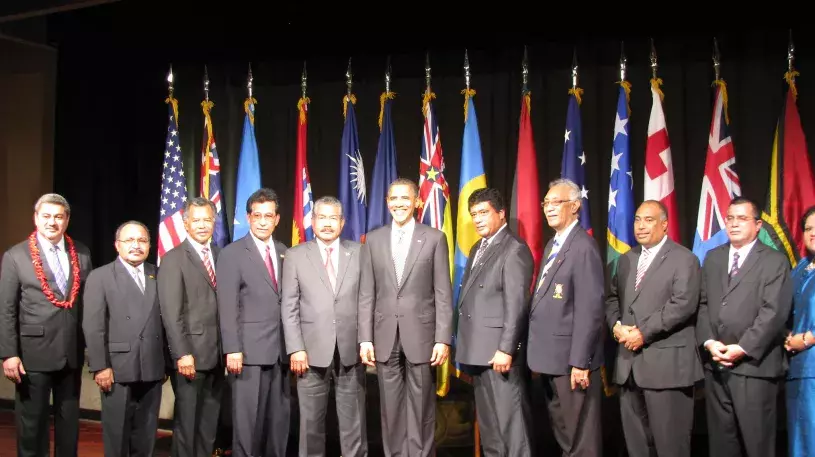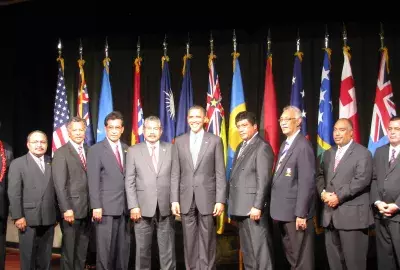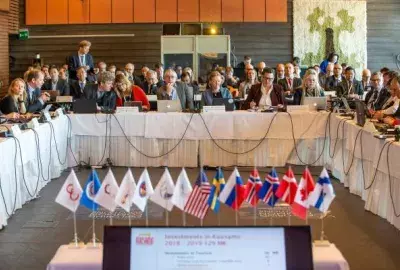Error message

By Suzanne Vares-Lum, East-West Center President
and Charles E. Morrison, former EWC President and APEC scholar
This article was originally published by the Honolulu Star-Advertiser on December 6, 2022. Reprinted by permission.
Even though San Francisco, not Honolulu again, has now been announced as the US host city for next fall’s APEC summit of Asia-Pacific leaders, there are still many ways in which the regional economic grouping matters to Hawai‘i.
This week, senior diplomatic officials from the forum’s 21 member economies will be meeting at the East-West Center to begin negotiating the agenda for the coming year. Throughout 2023, the US will again be serving as the host nation for APEC—which stands for Asia-Pacific Economic Cooperation—as it last did in 2011, when President Obama hosted the leaders’ summit here. In the intervening years, APEC has changed in several ways that could significantly benefit Hawai‘i.
Shift to sustainability
The result has been a much greener APEC. During this year’s summit in Bangkok last month, the APEC leaders endorsed a set of goals aimed at transitioning to a climate-resilient global economy, emphasizing that the need to provide international technological and financial support is “key to that effort.”
Many factors, including more frequent extreme weather events, the pandemic, and the rise of digital and service economies, essentially caused the old APEC trade agenda to collapse. Today, the forum’s most urgent priorities are to build resilience and connectedness among APEC economies, while increasing inclusion and outreach to additional stakeholders. As the incoming host, the US is determined to ensure that APEC’s agenda is of direct benefit to workers, families, and businesses—including smaller ones.
This focus could particularly benefit Hawai‘i if it gives us an enhanced role in the APEC work program, which is pursued through 200 working-level meetings over the year. At these levels, the organization is remarkably open to new stakeholders, and its decentralized model facilitates engagement with local communities and civil-society organizations like the East-West Center and numerous others.
With APEC’s new emphasis on a “circular-economy” approach to reducing carbon emissions and addressing plastic waste and other forms of pollution, Hawai‘i’s aspirations for a green future can be a model in these areas.
Supply chain security
Over the past two years, we have seen first-hand how a global crisis can disrupt supply chains, leaving empty shelves and driving up prices for many essential products. APEC’s intensified work on diversified and resilient supply chains—including more secure logistics and reduced bureaucratic barriers—seeks to keep goods moving efficiently, reliably, and at stable prices.
This is especially critical for an isolated island community like ours that is dependent on the uninterrupted flow of outside supplies.
APEC also seeks more efficiency and access for the service economy, which is by far our largest economic sector. APEC’s push for mutual recognition of vaccination documents and other measures is helping to rebuild Asia-related tourism, which of course is of great value for Hawai‘i.
Pacific prominence
Since Papua New Guinea is the only developing Pacific Island nation with membership in APEC, the East-West Center invited other island leaders to attend parts of the 2011 APEC leaders’ meeting and meet with President Obama. Today, the Pacific Islands are more prominent on the world stage as they confront the existential threat of climate change, and as geopolitical competition intensifies in the region. As the Center’s own longstanding work in convening Pacific Islands leaders and experts also increasingly comes to the policy fore, we can help expand beneficial APEC-Pacific Islands connections in the coming year.
Despite many challenges in the political environment, including friction with members Russia and China, APEC remains the premier institution for pragmatic, mutually beneficial international cooperation across our part of the world. East-West Center is honored to again be hosting this week’s kick-off meeting of senior officials for the US host year, as we did in late 2010. For us, it is an exceptional opportunity to showcase why we believe Hawai‘i, and the Center, are ideally suited to convene high-level international dialogues of this caliber.
By Suzanne Vares-Lum, East-West Center President
and Charles E. Morrison, former EWC President and APEC scholar
This article was originally published by the Honolulu Star-Advertiser on December 6, 2022. Reprinted by permission.
Even though San Francisco, not Honolulu again, has now been announced as the US host city for next fall’s APEC summit of Asia-Pacific leaders, there are still many ways in which the regional economic grouping matters to Hawai‘i.
This week, senior diplomatic officials from the forum’s 21 member economies will be meeting at the East-West Center to begin negotiating the agenda for the coming year. Throughout 2023, the US will again be serving as the host nation for APEC—which stands for Asia-Pacific Economic Cooperation—as it last did in 2011, when President Obama hosted the leaders’ summit here. In the intervening years, APEC has changed in several ways that could significantly benefit Hawai‘i.
Shift to sustainability
The result has been a much greener APEC. During this year’s summit in Bangkok last month, the APEC leaders endorsed a set of goals aimed at transitioning to a climate-resilient global economy, emphasizing that the need to provide international technological and financial support is “key to that effort.”
Many factors, including more frequent extreme weather events, the pandemic, and the rise of digital and service economies, essentially caused the old APEC trade agenda to collapse. Today, the forum’s most urgent priorities are to build resilience and connectedness among APEC economies, while increasing inclusion and outreach to additional stakeholders. As the incoming host, the US is determined to ensure that APEC’s agenda is of direct benefit to workers, families, and businesses—including smaller ones.
This focus could particularly benefit Hawai‘i if it gives us an enhanced role in the APEC work program, which is pursued through 200 working-level meetings over the year. At these levels, the organization is remarkably open to new stakeholders, and its decentralized model facilitates engagement with local communities and civil-society organizations like the East-West Center and numerous others.
With APEC’s new emphasis on a “circular-economy” approach to reducing carbon emissions and addressing plastic waste and other forms of pollution, Hawai‘i’s aspirations for a green future can be a model in these areas.
Supply chain security
Over the past two years, we have seen first-hand how a global crisis can disrupt supply chains, leaving empty shelves and driving up prices for many essential products. APEC’s intensified work on diversified and resilient supply chains—including more secure logistics and reduced bureaucratic barriers—seeks to keep goods moving efficiently, reliably, and at stable prices.
This is especially critical for an isolated island community like ours that is dependent on the uninterrupted flow of outside supplies.
APEC also seeks more efficiency and access for the service economy, which is by far our largest economic sector. APEC’s push for mutual recognition of vaccination documents and other measures is helping to rebuild Asia-related tourism, which of course is of great value for Hawai‘i.
Pacific prominence
Since Papua New Guinea is the only developing Pacific Island nation with membership in APEC, the East-West Center invited other island leaders to attend parts of the 2011 APEC leaders’ meeting and meet with President Obama. Today, the Pacific Islands are more prominent on the world stage as they confront the existential threat of climate change, and as geopolitical competition intensifies in the region. As the Center’s own longstanding work in convening Pacific Islands leaders and experts also increasingly comes to the policy fore, we can help expand beneficial APEC-Pacific Islands connections in the coming year.
Despite many challenges in the political environment, including friction with members Russia and China, APEC remains the premier institution for pragmatic, mutually beneficial international cooperation across our part of the world. East-West Center is honored to again be hosting this week’s kick-off meeting of senior officials for the US host year, as we did in late 2010. For us, it is an exceptional opportunity to showcase why we believe Hawai‘i, and the Center, are ideally suited to convene high-level international dialogues of this caliber.
Web Article
Recent online articles and analysis that have been published on the East-West Center website.







